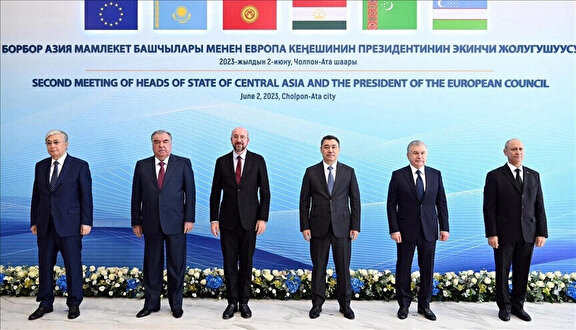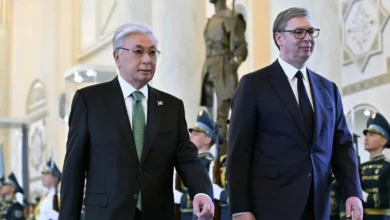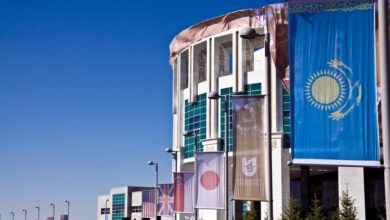
As part of the second meeting of the heads of state of Central Asia and the President of the European Council in the city of Cholpon-Ata, Issyk-Kul region, a joint press communique was adopted, Turanews.kz reports citing Kabar reports.
The document was signed by the Presidents of Kyrgyzstan Sadyr Japarov, Kazakhstan Kassym-Jomart Tokayev, Tajikistan Emomali Rahmon, Turkmenistan Serdar Berdimuhamedov (represented by the Deputy Chairman of the Cabinet of Ministers of Turkmenistan Nurmuhammet Amannepesov), Uzbekistan Shavkat Mirziyoyev and the head of the European Council Charles Michel.
During an open and constructive meeting, the participants reviewed the multilateral and mutually beneficial cooperation between the European Union and the states of Central Asia since last year’s inaugural meeting in Astana, and also discussed relations between the European Union and Central Asia in the context of international events. They reaffirmed their commitment to continuing the high-level dialogue between Central Asia and the European Union and developing the EU-CA partnership in accordance with the priority areas identified between the parties with the common goal of prosperity and security in Central Asia,” the document says.
The leaders welcomed the contribution of existing and new high-level platforms in support of the further institutionalization of relations between the countries of Central Asia and the European Union.
The participants expressed satisfaction with the positive results of the latest EU-CA dialogues and platforms, in particular the Second EU-CA Economic Forum held in Almaty on May 18-19, 2023, the Civil Society Forum in Tashkent on March 10, 2023, the High level of the EU-CA on environment and water in Rome on February 23-24, 2023, the EU-CA Conference on Interconnectivity and the EU-CA Ministerial Meeting held in Samarkand on November 18-19, 2022. The participants expressed their intention to adopt the Road EU-CA map at the next ministerial meeting.
They confirmed their readiness to continue ambitious cooperation based on mutual respect and mutual support.
The leaders expressed their unwavering commitment to upholding the UN Charter, in particular the principles of respect for the independence, sovereignty, territorial integrity of all countries, the non-use or threat of force, and the peaceful settlement of international disputes.
The participants expressed their common concern about the deteriorating situation in Afghanistan and reaffirmed their commitment to making Afghanistan a secure, peaceful, stable and prosperous country.
In this regard, they recognized the efforts of the international community to provide assistance to the people of Afghanistan on a principled basis and in accordance with international law and generally recognized norms and principles, despite difficult circumstances.
The participants called on the international community to intensify humanitarian assistance to the people of Afghanistan and noted the key role of the UN in providing humanitarian assistance to Afghanistan on a principled basis. They stressed the importance of establishing an inclusive and representative government, as well as the importance of promoting and respecting the human rights and fundamental freedoms of all citizens of Afghanistan, especially women, girls and ethnic groups.
In this regard, they noted the importance of the dialogue between the European Union and Central Asia on Afghanistan, including the outcome of the Fourth Meeting of Special Representatives and Special Envoys of the European Union and Central Asia on Afghanistan, held on May 25-26 in Ashgabat.
They emphasized the inadmissibility of public calls and incitement to terrorism and extremism, and called for intensifying efforts to combat the spread of ideology and propaganda of terrorism via the Internet.
In this regard, the Leaders called for the consistent implementation of the relevant resolutions of the UN Security Council on countering the spread of terrorist, separatist and extremist ideologies, including on the Internet.
The leaders noted the need to strengthen cooperation between Central Asia and the European Union on old, new and emerging challenges, as outlined in the EU Strategy for Central Asia and in line with universal principles.
The leaders instructed their foreign ministers and EU High Representative Josep Borrell to formalize and advance the implementation of the Joint Roadmap to deepen ties between the European Union and Central Asia.
They reaffirmed their joint commitment to work towards achieving the Sustainable Development Goals and in this regard stressed the importance of further cooperation to strengthen the rule of law, democracy, good governance, gender equality and universal human rights and fundamental freedoms, as outlined in the European Union Strategy for Central Asia from 2019.
The President of the European Council also highly appreciated the considerations on green transition, environmental protection and combating climate change in Central Asia, which were discussed at the last Consultative Meeting of the Heads of State of Central Asia in Cholpon-Ata.
The leaders stressed the importance of further expanding mutual trade and investment mechanisms to accelerate the socio-economic development of all parties. They also stressed the importance of close dialogue in the context of the European Union’s sanctions regime.
The participants confirmed their interest in strengthening joint actions for the full and effective implementation of the obligations of the parties under the Paris Agreement.
The participants noted the negative impact of the Aral Sea catastrophe on regional security and spoke in favor of the need to intensify joint efforts to find the most acceptable ways to overcome the problem.
They reaffirmed the importance of working together to expand people-to-people connections, especially youth, in Europe and Central Asia, including through higher education, culture and tourism. The leaders called on the Foreign Ministers to further develop these initiatives as part of the Joint Roadmap to deepen ties between the European Union and Central Asia. They noted the importance of strengthening interaction between think tanks and civil society, and also discussed the opportunities for joint training of diplomats from Central Asia, including those in the European Union.
The President of the European Council supported the efforts of the Central Asian countries aimed at ensuring prosperity, peace, sustainable development, good neighborliness, trust and friendship in the region and welcomed the strengthening of regional cooperation within the framework of the Consultative Meetings of the Heads of State of Central Asia and looks forward to the results of the upcoming Fifth Consultative Meeting of the Heads of State of Central Asia , which will be held in the Republic of Tajikistan.
The President of the European Council welcomed the ongoing efforts for socio-economic and democratic reforms in the region, as well as the positive results of regional cooperation as an important basis for cooperation between the EU and CA.
On the occasion of the 30th anniversary of the establishment of the International Fund for Saving the Aral Sea (IFAS), he congratulated IFAS on the important work done to improve the environmental situation in the areas affected by the Aral Sea disaster and to solve socio-economic problems in the region.
The participants expressed their deep gratitude to Kyrgyzstan for hosting the second meeting of the Heads of State of Central Asia and the President of the European Council.
The leaders agreed to meet on a regular basis, intending to hold their next meeting in the format of the first summit next year.
The Uzbek side offered to hold a meeting in Uzbekistan, the document says.
The website of Anadolu Agency publishes only a part of the news in a shortened form, which is provided to subscribers through the News Feed System (HAS) of AA.



